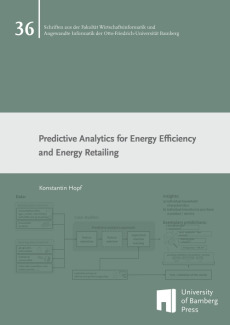Konstantin Hopf
Predictive Analytics for Energy Efficiency and Energy Retailing
Reihe: Schriften aus der Fakultät Wirtschaftsinformatik und Angewandte Informatik der Otto-Friedrich-Universität BambergDigitization causes large amounts of data in organizations (e.g., transaction data from business processes, communication data, sensor data). Besides, a large number of data sources are emerging online and can be freely used. Firms are looking for ways to commercialize this increasing amount of data and research aims to better understand the data value creation process. The present dissertation answers five central research questions in this context and examines how machine learning (ML) can be used to create value from data, using case studies from energy retailing and energy efficiency. First, a systematic literature review gives an overview of firm internal and external data sources for potential analyses. Second, the importance of human cognition, theory, and expert knowledge in effective data preparation for ML is demonstrated. Third, current ML algorithms and variable selection methods are empirically compared using industry data sets. Implications for theory and practice are identified. Finally, the successful use of the information gained through ML is exemplified through case studies where increased energy efficiency, customer value, and service quality can demonstrate economic, environmental, and social value. Thus, this empirical work contributes to the so far rather conceptual discussion on value creation from big data in information systems research.
